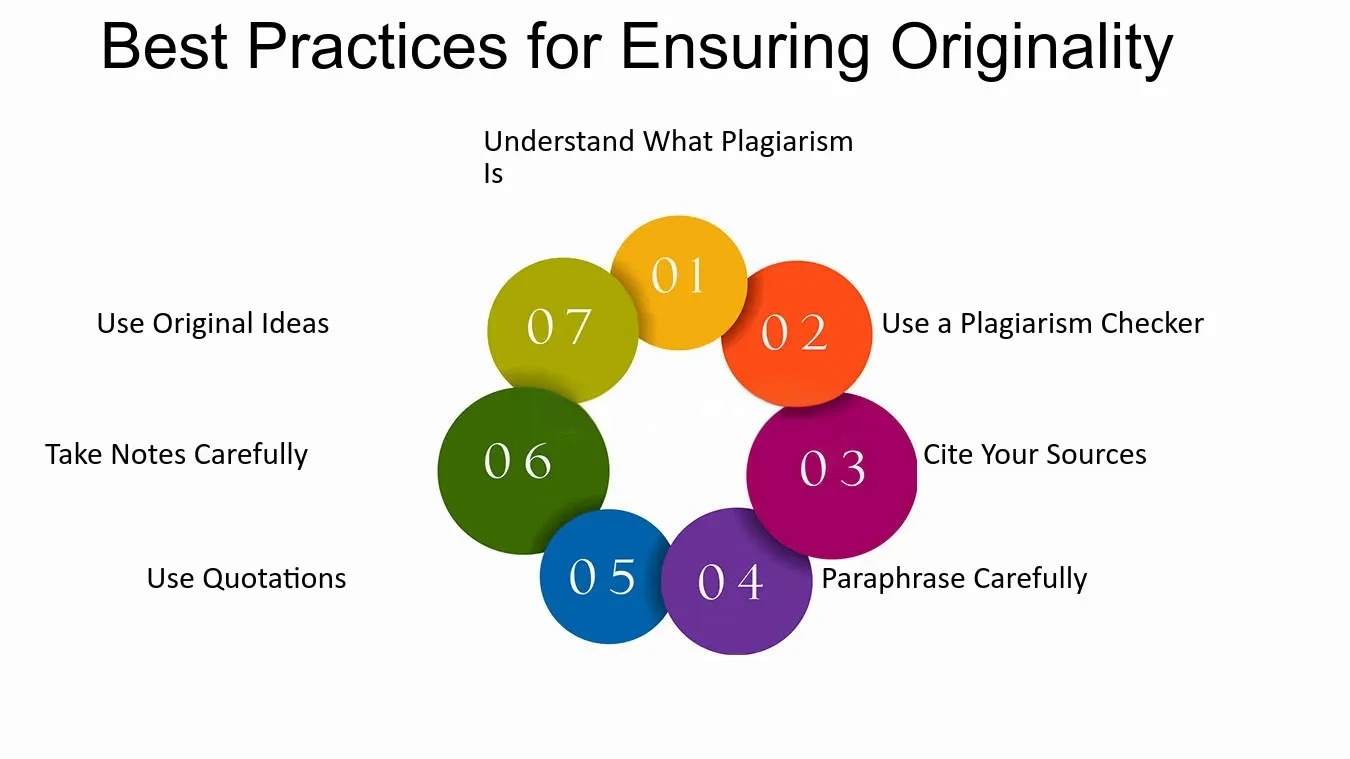Best Practices For Ensuring Originality In Scholarly Publications
Researchers must navigate the fine line between building on existing knowledge and ensuring their work remains authentic. Plagiarism-whether intentional or accidental-can severely damage reputations, lead to retracted publications, and hinder academic progress.
Author:Suleman ShahReviewer:Han JuMar 10, 20254.9K Shares80.4K Views

Originality is the backbone of scholarly research, shaping academic integrity and contributing to the advancement of knowledge. However, in an era where AI-generated content and vast digital resources are at our fingertips, maintaining originality has become increasingly challenging. Researchers must navigate the fine line between building on existing knowledge and ensuring their work remains authentic.
Plagiarism-whether intentional or accidental-can severely damage reputations, lead to retracted publications, and hinder academic progress. This guide outlines essential practices to safeguard originality in scholarly writing, prevent plagiarism, and uphold the highest standards of research ethics.
Understanding Originality And Plagiarism
Originality in academic writing is more than just presenting new ideas-it’s about contributing fresh perspectives while acknowledging existing research. Plagiarism, on the other hand, occurs when ideas, data, or text are used without proper attribution.
Types Of Plagiarism:
- Direct plagiarism - Copying text verbatim without citation.
- Mosaic plagiarism - Blending phrases from multiple sources without proper acknowledgment.
- Patchwork plagiarism - Rearranging borrowed content from various sources.
- Self-plagiarism - Reusing one’s own published work without disclosure.
- Accidental plagiarism - Failing to cite correctly due to oversight.
With the rise of AI-generated content, researchers must also be vigilant about ensuring that machine-generated text does not compromise originality.
Consequences Of Plagiarism In Scholarly Publications
Plagiarism is not just an ethical breach, it carries serious consequences:
- Academic repercussions - Retraction of papers, loss of credibility, and potential expulsion.
- Professional damage - Loss of career opportunities and academic standing.
- Legal consequences - Copyright infringement can lead to lawsuits.
- Hindrance to innovation - Plagiarism stifles intellectual growth and academic progress.
For example, an assistant professor lost her position after an oversight in citation led to accusations of plagiarism. Her book was retracted, demonstrating how even unintentional mistakes can be devastating
10 Key Practices For Maintaining Originality
1. Rigorous Research And Meticulous Note-Taking
The foundation of original scholarship lies in rigorous research and meticulous note-taking. Begin by establishing a systematic research process, ensuring clear distinctions between your own thoughts and borrowed ideas.
Employ effective note-taking strategies, such as using distinct colors or digital tags, to track sources and prevent accidental plagiarism. From the outset, document all sources with proper citations, laying the groundwork for accurate referencing.
2. Developing Critical Thinking And Analytical Skills
Cultivate critical thinking and analytical skills to foster original thought. Engage deeply with existing research, analyzing methodologies, interpretations, and conclusions. Challenge assumptions, explore alternative perspectives, and strive to form independent conclusions. By developing your analytical prowess, you'll be better equipped to contribute unique insights to your field.
3. Mastering Paraphrasing And Summarization Techniques
Effective paraphrasing transcends mere word substitution. It requires a deep understanding of the source material and the ability to re-express it in your own words. Avoid patch writing by synthesizing information from multiple sources. Remember, even paraphrased ideas require proper citation. Avoid using paraphrasing tools, as they can lead to unintended plagiarism.
- Avoid looking at the original text while paraphrasing.
- Focus on the main idea rather than the details.
- Use paraphrasing as a tool for critical thinking.
4. Implementing A Robust Research Strategy
A structured research strategy is essential for ensuring originality. Begin with a comprehensive literature review to identify gaps in knowledge and emerging trends. Formulate a well-defined research question that addresses these gaps.
Select appropriate methodologies, ensuring they align with your research objectives. Employ rigorous data collection and analysis techniques. Seek collaboration and feedback from peers and mentors. Document your research process meticulously, maintaining transparency and accountability.
5. Utilizing Reputable Plagiarism Detection Tools
Utilize reputable tools such as iThenticate, AI detectorand Originality.AI, understanding their strengths and limitations. Various tools help ensure originality and enhance scholarly writing:
| Tool | Purpose |
| AI Detector | Detects AI-generated content & plagiarism. |
| Turnitin | Plagiarism detection for academic papers. |
| Grammarly | Checks for grammar and plagiarism issues. |
| iThenticate | Ensures originality in research manuscripts. |
| Zotero/EndNote | Manages references and citations. |
| Hemingway Editor | Improves readability and clarity. |
6. Mastering Proper Citation And Referencing
Accurate citation and referencing are cornerstones of academic integrity. Familiarize yourself with various citation styles (APA, MLA, Chicago), adhering to the guidelines prescribed by your institution or publisher. Cite all sources meticulously, ensuring accuracy and consistency. Utilize reference management software like Zotero or Mendeley to streamline the citation process and maintain organized bibliographies.
7. Adhering To Collaborative Authorship Guidelines
Collaborative projects necessitate clear communication and attribution. Establish authorship agreements that delineate roles, responsibilities, and intellectual contributions. Maintain transparent communication throughout the research process, ensuring all co-authors are aware of their contributions and the work of others.
8. Staying Updated On Academic Integrity Standards
Academic integrity standards evolve, requiring ongoing vigilance. Stay informed about the latest ethical guidelines and best practices. Consult resources such as the World Conferences on Research Integrity Foundation (WCRIF) and the Committee on Publication Ethics (COPE). Understand the publisher's role in detecting plagiarism.
9. Seeking Feedback And Engaging In Peer Review
Peer review serves as a vital safeguard against plagiarism. Engage in peer review processes, both as a reviewer and a reviewee. Utilize feedback constructively, refining your work and addressing potential issues. Seek expert feedback from mentors and colleagues, enhancing the quality and originality of your research.
10. Creating A Culture Of Integrity In Academic Writing
Foster a culture of integrity by leading by example, embedding integrity in education, and fostering open communication. Address plagiarism constructively, focusing on learning and improvement. Build a community of integrity, where ethical conduct is valued and upheld.
- Write in your own words or from your own perspective.
- Use proper citations.
- Organize citations with tools like Mendeley or Zotero.
- Self-review your work.
- Use a reputable plagiarism checker.
- Address plagiarism flags.
- Re-run the check.
- Learn from the experience.
- Improve and practice.
FAQs
How Do You Ensure Originality In Academic Writing?
The key is to build on existing knowledge while adding a unique perspective. Engage in deep research, critically analyze sources, and develop independent conclusions. Properly paraphrase, cite all references, and use plagiarism detection tools to verify originality.
How Can Researchers Ensure Their Work Demonstrates Originality?
Researchers can ensure originality by formulating novel research questions, employing innovative methodologies, and critically engaging with existing literature. Conducting thorough literature reviews and identifying research gaps also help establish original contributions.
How To Check The Originality Of A Research Paper?
Use plagiarism detection tools like Turnitin, iThenticate, and ZeroGPT.com to identify text similarities. Additionally, peer reviews and expert feedback can help assess the uniqueness of the research.
What Is Ensuring Original Writing?
Ensuring original writing means expressing ideas in your own words while maintaining the integrity of the source material. It involves avoiding plagiarism, citing sources correctly, and incorporating critical thinking to contribute new insights rather than merely rewording existing content.
Are Plagiarism Detection Tools Foolproof?
No, but they are valuable tools. Use them in conjunction with careful review and proper citation practices.
Quick Recap
Maintaining originality in scholarly publications requires a multi-faceted approach. Researchers must conduct thorough research, take organized notes, and develop critical thinking skills to generate unique insights.
Mastering proper citation and paraphrasing techniques is essential to avoid unintentional plagiarism. Utilizing plagiarism detection and AI verification tools adds an extra layer of scrutiny, ensuring the authenticity of academic work.
Ethical authorship and engagement in peer review further reinforce integrity, while staying informed about evolving academic integrity policies helps researchers navigate ethical challenges. Upholding originality is not just about avoiding plagiarism-it’s about making meaningful, ethical contributions that advance knowledge and strengthen the credibility of scholarly research.

Suleman Shah
Author
Suleman Shah is a researcher and freelance writer. As a researcher, he has worked with MNS University of Agriculture, Multan (Pakistan) and Texas A & M University (USA). He regularly writes science articles and blogs for science news website immersse.com and open access publishers OA Publishing London and Scientific Times. He loves to keep himself updated on scientific developments and convert these developments into everyday language to update the readers about the developments in the scientific era. His primary research focus is Plant sciences, and he contributed to this field by publishing his research in scientific journals and presenting his work at many Conferences.
Shah graduated from the University of Agriculture Faisalabad (Pakistan) and started his professional carrier with Jaffer Agro Services and later with the Agriculture Department of the Government of Pakistan. His research interest compelled and attracted him to proceed with his carrier in Plant sciences research. So, he started his Ph.D. in Soil Science at MNS University of Agriculture Multan (Pakistan). Later, he started working as a visiting scholar with Texas A&M University (USA).
Shah’s experience with big Open Excess publishers like Springers, Frontiers, MDPI, etc., testified to his belief in Open Access as a barrier-removing mechanism between researchers and the readers of their research. Shah believes that Open Access is revolutionizing the publication process and benefitting research in all fields.

Han Ju
Reviewer
Hello! I'm Han Ju, the heart behind World Wide Journals. My life is a unique tapestry woven from the threads of news, spirituality, and science, enriched by melodies from my guitar. Raised amidst tales of the ancient and the arcane, I developed a keen eye for the stories that truly matter. Through my work, I seek to bridge the seen with the unseen, marrying the rigor of science with the depth of spirituality.
Each article at World Wide Journals is a piece of this ongoing quest, blending analysis with personal reflection. Whether exploring quantum frontiers or strumming chords under the stars, my aim is to inspire and provoke thought, inviting you into a world where every discovery is a note in the grand symphony of existence.
Welcome aboard this journey of insight and exploration, where curiosity leads and music guides.
Latest Articles
Popular Articles
